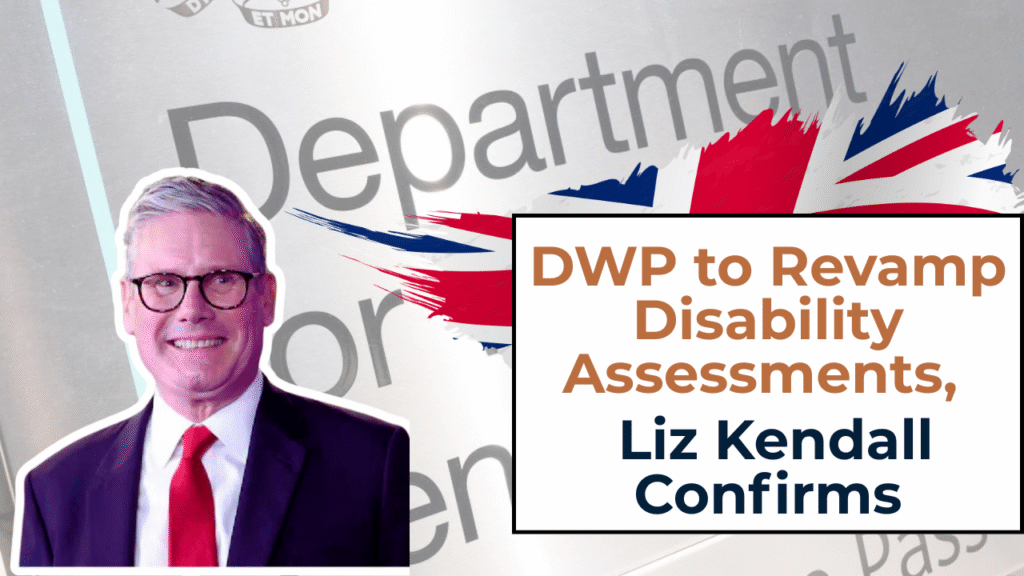The Labour Party’s Liz Kendall has officially confirmed that a new assessment process for disability benefits is being developed by the Department for Work and Pensions (DWP). The move marks a significant step in the government’s effort to overhaul the current welfare system and ensure that it works better for disabled people across the UK.
New Direction for Disability Benefits
Speaking in her capacity as the Shadow Secretary of State for Work and Pensions, Liz Kendall said the government is now working on plans to reform how disability benefits are assessed. She confirmed that a new system is “under way,” aiming to replace the controversial and often-criticised Personal Independence Payment (PIP) assessments.
The overhaul is being positioned as part of a broader Labour strategy to restore trust in the welfare system and to provide more compassionate, accurate, and supportive services to people living with disabilities.
“We are going to change the current system because it simply isn’t working for many of the people who need support the most,” Kendall said. “The assessment process needs to be simpler, fairer, and more responsive to people’s real-life needs.”
Why Reform Is Needed
The existing assessment model, introduced in 2013 with the launch of PIP, has been heavily criticised for its lack of transparency and the high rate of successful appeals against decisions. Campaigners, charities, and claimants have consistently raised concerns about:
- Inaccurate assessments by private contractors
- Over-reliance on face-to-face evaluations
- Limited understanding of fluctuating and invisible conditions
- Excessive bureaucracy and long waiting times
Recent statistics show that a large number of decisions are overturned when challenged, further raising questions about the reliability of the original assessments.
The DWP has faced multiple legal challenges in recent years, with courts ruling that some of its assessment processes unlawfully discriminated against certain groups. These rulings have added pressure on the department to deliver reform that is both legally sound and publicly trusted.
What the New System Could Look Like
While full details have not yet been released, early reports suggest that the upcoming assessment system will:
- Place greater emphasis on medical evidence and supporting documentation
- Reduce the frequency of reassessments for people with lifelong or progressive conditions
- Offer alternative formats for assessments, including written, online, or remote evaluations
- Improve training for assessors with more focus on mental health and hidden disabilities
Kendall noted that the reforms will be developed with extensive input from disabled people, charities, and healthcare professionals to ensure the new model reflects the complexity and diversity of claimants’ experiences.
Collaboration and Consultation
The government is expected to launch a formal consultation period in the coming months, inviting feedback from:
- Disabled individuals
- Advocacy groups
- Health professionals
- Welfare experts
This collaborative approach is intended to ensure the new system is rooted in real-world understanding rather than theoretical policy.
“We can’t design a new system without listening to the people who use it,” Kendall added. “They are the experts in their own lives, and they must be at the heart of this process.”
Reaction from Disability Rights Groups
Early responses from disability rights organisations have been cautiously optimistic. While many remain sceptical given the history of repeated reforms that failed to deliver lasting change, there is hope that this announcement could signal a more meaningful shift.
James Taylor, Director of Strategy at Scope, commented, “We welcome the commitment to reform, but we will be watching closely to see whether it results in genuine improvements. For too long, disabled people have had to fight a system that felt designed to trip them up.”
Next Steps
No fixed timeline has been set for the introduction of the new assessment process, but it is expected to be rolled out in stages over the next two to three years. The DWP has committed to ensuring that no one currently receiving benefits will see their support stopped during the transition period.
In the meantime, current PIP and other disability-related benefit assessments will continue under the existing framework, although interim improvements may be introduced.
Broader Welfare Reform Agenda
The assessment changes come as part of Labour’s wider strategy to reform the benefits system and tackle poverty. Alongside disability benefit reforms, the party has also pledged to:
- Review the Universal Credit system
- Reduce sanctions for jobseekers
- Invest in local support services
- Tackle delays in payments and appeals
Liz Kendall has reiterated that restoring dignity to the welfare system is a key priority for Labour as it seeks to rebuild public trust.
Conclusion
The confirmation of a new disability benefits assessment model is a major development for millions of people across the UK who rely on government support. While the process is still in its early stages, the government’s commitment to involving stakeholders and prioritising fairness offers hope for a more humane and effective welfare system.
As more details emerge in the coming months, claimants and campaigners alike will be watching closely to ensure promises translate into meaningful action.
.




